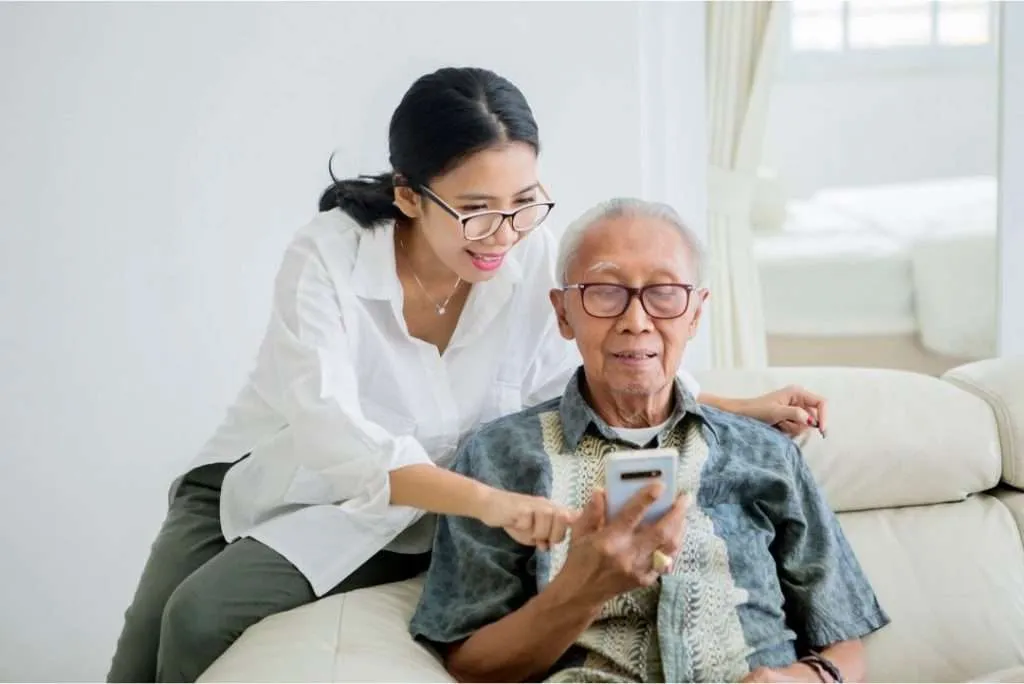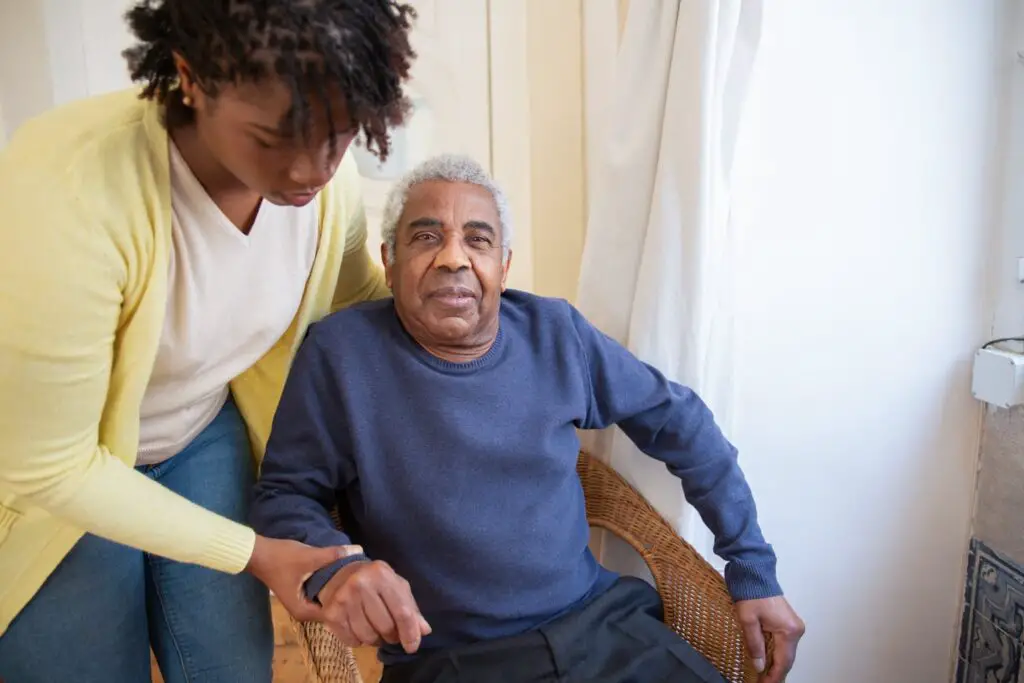You’ve probably heard the story of the five blind men who came upon an elephant. Each took hold of a different part of the creature’s body (trunk, tail, hoof, ear or side). Though each was touching the same animal, each came away with a different picture of an elephant. Each had a different vantage point, a different perspective, a different truth.
Our perspective colors the caregiving journey. We can see the stars, or we can focus on the dark night. We can insist we have the answers, or we can expand our view.
A new and broader perspective can help us be a better caregiver. It can foster more effective communication with our medical colleagues and family members, promote self-care, and release us from carrying unnecessary emotional burdens.
A Broad Perspective can Improve our Communication Skills

We can’t change the past, but we can change the lens through which we see the present.
Our perspective is based on our own experiences, beliefs, and assumptions. We interpret other people’s statements in this light. For example, if my experiences have taught me that all people are bad, I may have a hard time accepting help from anyone because I’ll believe they have ulterior motives. I might interpret a simple,“May I help you?” as a potential attack that I’ll ward off with statements such as “I can do it myself!” or “Why don’t you mind your own business?”
We can’t change the past, but we can change the lens through which we see the present. We can decide to be open to entertaining another point of view. New learning experiences that compel alternative interpretations of our reality can transform beliefs. A better understanding of another’s experience can change the way we view that person.
This greater understanding helps us re-frame our assumptions. There is a quote I’ve seen quite often on social media: “Someone with dementia isn’t giving you a hard time, they are having a hard time.” How true!
As long as I believe that my loved one is being belligerent and conflict-seeking, I will communicate with them in that fashion. I may be accusatory, raise my voice, and further escalate the tension and confusion they are experiencing. However, if I understand that dementia has no logic and my loved one is coping as best they can, I can approach them in a comforting and creative way to meet their needs.
As caregivers, we must be mindful of how our actions might be perceived by those we are trying to help.
What can you do?
Stretch your perspective by asking questions. Listen and affirm the other’s concerns. Relate how your assistance can meet their specific need, as seen from their point of view.
Proper Self-Care can Promote Better Caregiving
We try to take on the caregiving responsibilities of an entire institution by ourselves. We care out of guilt. We care because we care too much.
Do you value yourself? The knee-jerk response is “Yes, of course!” But do you truly believe you are worth taking care of? Your answer will reveal how well you care for yourself.
I’m not talking necessarily about getting your hair or nails done. I’m talking about preserving your energy, establishing boundaries, and giving yourself room to grow as an individual. Many carers are, by nature, givers. This can lead us to over extend ourselves and harm our health. Self-care is not selfish.
You MUST care for the caregiver. It is as much your duty as the care you give your love done. If you drive yourself into the ground, what will happen to them?
How might we destroy ourselves while taking care of others? Because we try to do more than is humanly possible. We try to take on the caregiving responsibilities of an entire institution by ourselves. We care out of guilt. We care because we care too much.
Let’s face it: caregiving is a big job. There’s more to do than we can do alone. We are not Atlas. We need to create space for ourselves in our caregiving plan.
Since caregiving is such a large job, you also must balance it with the rest of your life. You can make work, family, and caregiving all balance with the proper planning.
What can you do?
Shift your perspective to a caregiving ‘we’. Understand the necessity of teamwork and bend your energies toward establishing a caregiving team. As John Maxwell said, “Teamwork makes the dream work.” Our caregiving vision cannot be realized in isolation.
Let Go of Unnecessary Emotional Burdens

Reflect on a recent event that left you feeling frustrated and tired. Were you doing things for fear of what family or friends might say? Did you overdo it because you’re afraid someone else won’t do the job as well? Are there strings attached to your giving?
Caregivers carry the burden of promoting another person’s physical health and wellbeing. The social context of caregiving creates additional stresses. We don’t live in a perfect world, so we don’t live in perfect families.
We may be faced with the task of caring for a loved one who did not care for us, or have an uphill battle when asking other family members to participate in care. This interpersonal tension can weigh heavily on us.
Your caregiving style may also be adding an unnecessary emotional burden. Reflect on a recent event that left you feeling frustrated and tired. Were you trying to ‘people please’? Were you doing things for fear of what family or friends might say?
Did you overdo it because you’re afraid someone else won’t do the job as well? Or were you struggling to find peace because you’re constantly fighting for things to be done a certain way? Did you disagree with what your loved one felt was best for them? Are there strings attached to your giving?
What if you live 2000 miles away? How can you function well as a remote caregiver if you obsess over details that are best handled by people close to your loved one?
In these cases, you could be a caretaker. Both extremes cause you to shoulder unnecessary emotional burdens. There are no easy answers, but our frame of reference can help us navigate the difficulties.
What can you do?
Shift your focus. You might not be able to change the way you feel, but you can control what you do. Focus on your plan of action and move on principle, not on feelings. Expecting vindication, validation, reconciliation or remorse can leave you empty if they are not realized.
Re-imagine your social context. Involve a third party (professional care manager, physician, etc.) to act as mediator if needed. This is a great help if a situation becomes re-traumatizing.
Remember that you do have a choice in the matter, especially if your mental and physical health are at risk. Distancing yourself from the patient’s history (professional detachment) may allow you to be more effective.
Join a support group so you can understand what feelings are normal in the caregiving lifecycle. Support groups can also help you to build confidence and navigate tense family care situations.
Seek therapy if you’re having difficulty setting boundaries or managing thoughts of sorrow, depression or anger about your situation. Therapy can help you identify damaging patterns of thinking and work through complex feelings.
If you are a care-’taker’, seek other avenues to channel your need for control (i.e., by perfecting a skill or hobby). Understand that you are caring for an individual who has the right to dignity and self-determination, even if it is not your ideal.
The right perspective changes everything, even in caregiving. Push yourself to see with different eyes. It just might be the breakthrough you’re looking for.






